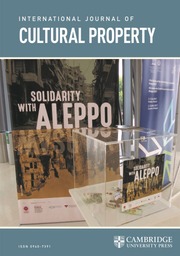Article contents
Law and Identity: Negotiating Meaning in the Native American Graves Protection and Repatriation Act
Published online by Cambridge University Press: 04 June 2007
Abstract
The enactment of the Native American Graves Protection and Repatriation Act (NAGPRA) in 1990 represented the culmination of a long process of negotiation and ultimate compromise between representatives of Native American tribes and American museums. This paper focuses on the initial implementation stage of NAGPRA. That stage reveals that interaction between the two sides has entailed (and continues to entail) negotiations not only concerning the disposition of specific Native American cultural objects but also equally important concerning the professional identities of Native Americans and museum professionals, respectively. Viewed in this way, NAGPRA's post-enactment process is seen to illustrate the various functions of law (both symbolic and concrete) in maintaining the social and ideological dialectic of American society.
- Type
- Articles
- Information
- Copyright
- Copyright © International Cultural Property Society 1997
- 3
- Cited by




